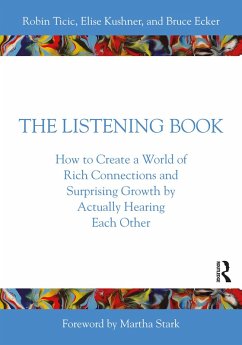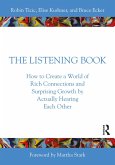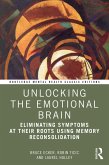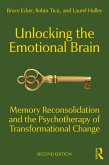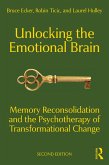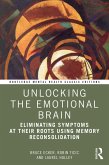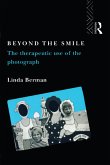Dieser Download kann aus rechtlichen Gründen nur mit Rechnungsadresse in A, B, BG, CY, CZ, D, DK, EW, E, FIN, F, GR, HR, H, IRL, I, LT, L, LR, M, NL, PL, P, R, S, SLO, SK ausgeliefert werden.
"If you thought you knew what listening is and does, get ready for a mind- and heart-opening journey of discovery. This remarkable tour through the universe of listeners' responses comes alive with the visceral impacts of attuned versus misattuned listening. The Listening Book is a potent, unique, and inspiring guide for enriching and deepening your experience of human connection."-Diane Poole Heller, PhD, psychotherapist and author of The Power of Attachment: How to Create Deep and Lasting Intimate Relationships
"With charming stories, practical suggestions, and deep insights, this beautiful book shows us how to truly listen-with profound benefits for others, and oneself. It's really a gem, a delightful and comprehensive guide to one of the most important human skills."-Rick Hanson, PhD, author of Hardwiring Happiness: The New Brain Science of Contentment, Calm, and Confidence and Making Great Relationships: Simple Practices for Solving Conflicts, Building Cooperation, and Fostering Love
"When I was training counselors my repeated advice was 'stop and listen.' If the professional listeners needed reminding, how much more the rest of us! Ticic, Kushner, and Ecker have given us the essential and pragmatic guide to listening for a world that has, to a large degree, stopped listening. But with active listening and empathic responding we can change the world, and The Listening Book will equip you to do just that."-Matthew Dahlitz, MC, editor in chief of The Science of Psychotherapy and co-author of The Practitioner's Guide to the Science of Psychotherapy
"The Listening Book is a great way to unpack what listening is all about. Whether you are a good listener who wants to get better, or a not-so-good listener who is perplexed about why your conversations invariably hit walls, this book is for you. This book is also a dream book for therapy students and therapists, especially for those early in their path. Regardless of the model you are practicing, this book will show you, step by accessible step, what to do and also very importantly, what not to do so that your clients feel heard and understood-because once they do, then you can use all the other fancy techniques you are learning, and they will work. Finally, this book is for your inner nerd who wants to have the science behind listening and its transformative powers.
All this is accomplished through ordinary and relatable stories of people in different interpersonal situations: The dialogue is broken down, line by line, into connecters and disconnectors: The reader gets to see so clearly how certain comments help people feel understood, while other seemingly innocuous responses alienate and distance. We get a kind of x-ray of people's inner thoughts and inner experience where the protagonists tell us their experience of the comments they receive in such a way that we know exactly why they felt understood and "gotten" or, alternatively, painfully misunderstood, dismissed and turned off to that relationship.
Add to this the cutting-edge neuroscience of memory reconsolidation that explains how feeling heard can be a life-changing, transformative experience, particularly for those who have not felt heard in this way, and you've got yourself a gem of a book: super accessible, easy to read, easy to understand and most important of all, easy to apply. The Listening Book is a how-to guide for being a good listener and making those around you, be they family, friends, lovers or clients, feel heard, gotten and understood." - Diana Fosha, PhD, developer of AEDP, founder of the AEDP Institute, and editor of Undoing Aloneness and the Transformation of Suffering into Flourishing: AEDP 2.0

